#ramakrishna paramahamsa
Text
“I wept before the Mother and prayed. “O Mother, please tell me, please reveal to me what the yogis have realized through yoga and the jnanis through discimination.” And the Mother has revealed everything to me. She reveals everything if the devotee cries to Her with a yearning heart. She has shown me everything that is in the Vedas, the Vedanta, the Puranas, and the Tantra.”
“My Mother! Who is my Mother? Ah, She is the Mother of the Universe. It is She who creates and preserves the world, who always protects Her children, and who grants whatever they desire : dharma, artha, kama, moksha. A true son cannot live away from his mother. The mother knows everything. The child only eats, drinks, and makes merry, he doesn’t worry himself about the things of the world.”
“The divine Mother is always playful and sportive. This universe is Her play. She is self-willed and must always have Her own way. She is full of bliss. She gives freedom to one out of a hundred thousand…”
Ramakrishna Paramahamsa
40 notes
·
View notes
Text
''Bliss is a thing which is always there and is not something which comes and goes. That which comes and goes is a creation of the mind.'' - Ramana Maharshi
''Good and bad belong to emobodied beings, as does right & wrong. God is not affected by them.'' - Ramakrishna Paramahamsa
''Praise and blame, good and bad, even heat and cold, must be equally acceptable to us.'' - Swami Vivekananda
''...spirituality is not about a war between light and dark. It is about finding a level of awareness that goes beyond good and bad, a place from which you can understand and accept all things.'' - The Jeshua Channelings (Pamela Kribbe)
3 notes
·
View notes
Text

Goddess Kali Sitting on Lotus
Symbolism :
Kali symbolizes the death of the ego in the ultimate goal of human life in Hindu dharma -- moksha (liberation from the cycle of rebirth). Kali is the embodiment of time (kaala) and the female form of Shiva (Kaala). Her name literally means “she who is black”.
Kali is said to live in cemeteries amid decaying corpses, reminding us that our world is nothing but a cemetery where all things that are born must decay and die. She wears a garland of skulls to show us that we too must cut asunder the skeletons in our closet. She gives us the implements for our own personal excisions. She drips blood while consuming all of creation. She reminds us that every minute is constantly destroyed in the cycle of time.
We must rise above this manifested world to see Her in her infinitude, just as Sri Ramakrishna Paramahamsa, that great saint of Bengal, saw her. He found in her “the benign all-loving Mother.” He felt in her breath “the soothing touch of tender love and saw in her the seed of immortality.”
Born of Vishnu’s sense organs or perhaps the composite of Brahma-Vishnu-Shiva and the glory of the devas, she encourages us to come to our senses through teachers like Sri Ramakrishna. “You see her only as black because you are far away from her. Go near and you will find her devoid of all color. . .
The nearer you come to God, the more you will realize that (God) has neither name nor form.”
92 notes
·
View notes
Text
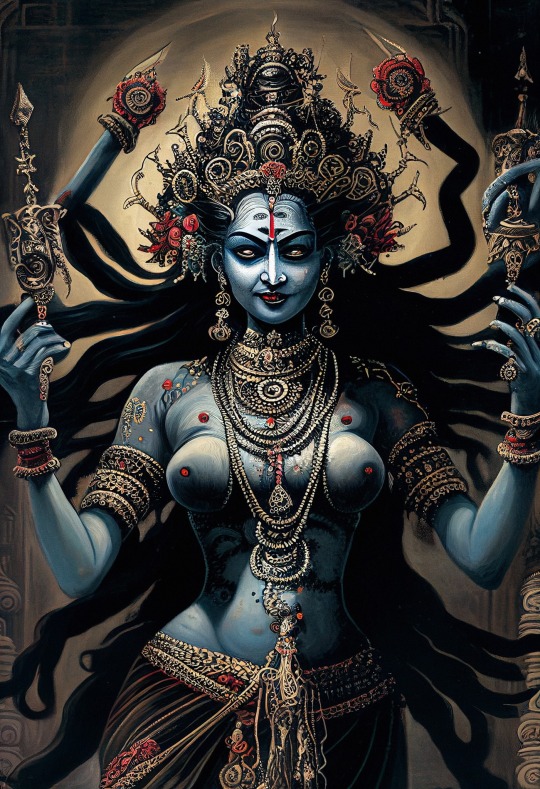


Ma Kali ॐ
Talon Abraxas
Symbolism
Kali symbolizes the death of the ego in the ultimate goal of human life in Hindu dharma — moksha (liberation from the cycle of rebirth). Kali is the embodiment of time (kaala) and the female form of Shiva (Kaala). Her name literally means “she who is black”.
Kali is said to live in cemeteries amid decaying corpses, reminding us that our world is nothing but a cemetery where all things that are born must decay and die. She wears a garland of skulls to show us that we too must cut asunder the skeletons in our closet. She gives us the implements for our own personal excisions. She drips blood while consuming all of creation. She reminds us that every minute is constantly destroyed in the cycle of time.
We must rise above this manifested world to see Her in her infinitude, just as Sri Ramakrishna Paramahamsa, that great saint of Bengal, saw her. He found in her “the benign all-loving Mother.” He felt in her breath “the soothing touch of tender love and saw in her the seed of immortality.”
Born of Vishnu’s sense organs or perhaps the composite of Brahma-Vishnu-Shiva and the glory of the devas, she encourages us to come to our senses through teachers like Sri Ramakrishna. “You see her only as black because you are far away from her. Go near and you will find her devoid of all color….The nearer you come to God, the more you will realize that (God) has neither name nor form.”
'Om Krim Kali'
23 notes
·
View notes
Text
CONVERSATIONS WITH ANNAMALAI SWAMI


Q: I know that peace will eventually come but at the moment I need to make a great effort to get even a little taste of it.
AS: Ramakrishna Paramahamsa once told a story about a jnani who had done a lot of tapas in a jungle. One day he went out of the jungle and met a poor man who was carrying a bundle of firewood.
This woodcutter saw that the jnani was radiating peace and bliss. 'Swami,' he asked, 'it seems that you have so much happiness. There is no trace of worry at all on your face. You are obviously a great man. Please show me some way that I can become rich. I am very poor. I barely make a living by cutting this firewood and selling it in town As I have to struggle a lot to survive I often get very frustrated with this way of life.'
The jnani asked him, 'Where are you cutting this wood?' and the man replied, 'Just at the edge of the forest.’
The jnani told him,’ Tomorrow go further inside and see what you can find there.’
The next day the woodcutter went further into the jungle than usual and found some sandalwood trees. He cut these trees, sold them in the market and made a lot of money. But he was not satisfied with this money so he came back to the jnani and asked how he could make even more.
The jnani repeated his original advice: ‘Go further into the jungle.’
The next day the woodcutter went deep into the jungle and found a lot of brass vessels which someone had abandoned there.
He thought to himself,’ The further I go into this forest more riches I seem to find. I will leave this brass and go a little further.'
In the middle of the forest, he found some gold and became a wealthy man.
I am telling you this story to show that when we desire to get away from all the troubles that identifying with the body causes us, we can go inwards, towards the Self. Instead of toiling and suffering in the mind, which is the outer edge of consciousness, we should move towards the Self, the center of our being.
As we start to move inwards we experience the peace and bliss of the Self in a very diluted form. The deeper we go, the stronger the experience becomes. Eventually, a time will come when we don't want to leave this experience at all. Instead, there is a continuous urge to go deeper and deeper into the Self.
When you lose all desires and attachments, the pure gold of the Self will reveal itself to you. In that final state, you don't experience peace and bliss. You ARE that peace and bliss. In that state, you are the equal of Siva.
You are saying that you have to make a great effort to experience even a little peace. Don't worry about this. Your effort will pay off sooner or later. If you persevere the peace and bliss will come unasked. If you give up your attachment to all thoughts except for the thought of the Self, you will find yourself being pulled automatically into the peace of the Self. If you practice intensively and correctly, you will find that the experience of this peace is addictive. When this happens you will lose interest in everything except the Self.
- LWB, p. 358
26 notes
·
View notes
Text
“It is the mind that makes one wise or ignorant, bound or emancipated” - Ramakrishna Paramahamsa
54 notes
·
View notes
Text

Sri Ramakrishna Paramahamsa, was a 19th-century Indian mystic and spiritual teacher who is revered by many Hindus as an embodiment of divine consciousness. He spoke about the concept of Turiya, which is a Sanskrit word that refers to the fourth state of consciousness beyond waking, dreaming, and deep sleep.
Ramakrishna taught that Turiya is a state of pure consciousness that can be experienced through spiritual practice, such as meditation. He believed that Turiya is the true nature of the self, which is obscured by the illusions of the material world.
In one of his teachings, Ramakrishna said, "Turiya is the pure state of consciousness, where there is no ego, no duality, and no differentiation between the knower, the known, and the knowledge. It is the state of oneness with the Divine, where one experiences the ultimate truth and bliss."
Alice Coltrane composed a jazz song about this:
“Turiya and Ramakrishna” by Alice Coltrane

Alice Coltrane (1937-2007) is famous for her contributions to jazz music as a pianist, organist, harpist, and composer. She was a key figure in the development of spiritual jazz.
8 notes
·
View notes
Text
स्वामी विवेकानंद - Swami Vivekanand Jayanti
📲 https://www.bhaktibharat.com/bhakt/swami-vivekanand

Subscribe BhaktiBharat YouTube Channel:
📥 https://www.youtube.com/bhaktibharat?sub_confirmation=1
🚩 रामकृष्ण परमहंस - Ramakrishna Paramahamsa
📲 https://www.bhaktibharat.com/bhakt/ramakrishna-paramahamsa
2 notes
·
View notes
Text
DAILY WISDOM - 188 : 6. The War between the Subject and the Object / నిత్య ప్రజ్ఞా సందేశములు - 188 : 6. విషయం మరియు వస్తువు మధ్య యుద్ధం

🌹. నిత్య ప్రజ్ఞా సందేశములు - 188 / DAILY WISDOM - 188 🌹
🍀 📖 మహాభారతం మరియు భగవద్గీత యొక్క ఆధ్యాత్మిక అంశాలు 🍀
✍️. ప్రసాద్ భరద్వాజ
🌻 6. విషయం మరియు వస్తువు మధ్య యుద్ధం 🌻
బాహ్య శక్తులు, విషయ వస్తువులు మీపై పెట్టే వొత్తిడి కౌరవులుగా చెప్పవచ్చు. ఆత్మాశ్రయమైన శక్తులను పాండవులతో పోల్చవచ్చు. కాబట్టి మహాభారతం అనేది విషయం మరియు వస్తువు మధ్య జరిగే యుద్ధం. ఇప్పుడు, ఈ వస్తువు ఏమిటో వివరించడం కూడా చాలా కష్టం. ఇది పెన్సిల్ కావచ్చు; అది చేతి గడియారం కావచ్చు; ఈ ప్రపంచంలో ఉన్న ఏదైనా ఒక వస్తువు కావచ్చు. ఆ వస్తువు ఒక మానవుడు కావచ్చు. ఇది మొత్తం కుటుంబం కావచ్చు, అది మొత్తం సమాజం కావచ్చు మరియు అది మొత్తం మానవజాతి కావచ్చు, లేదా మొత్తం భౌతిక విశ్వం కావచ్చు-ఇది మన ముందు ఉన్న వస్తువు.
చైతన్యం యొక్క స్వయానికి, బాహ్యానికి మధ్య జరిగే యుద్ధమే మహాభారతం. శ్రీ రామకృష్ణ పరమహంస చాలా మంచి ఉదాహరణ చెప్పేవారు. అగ్ని నెయ్యిని కాల్చగలదని అందరికీ తెలుసు. నిప్పు మీద నెయ్యి పోస్తే నెయ్యి ఉండదు. ఇది కాలిపోయింది; అది ఆవిరి అవుతుంది. అవును నిజమే, నెయ్యిని కాల్చి పూర్తిగా నాశనం చేసే శక్తి అగ్నికి ఉంది. కానీ, శ్రీ రామకృష్ణుడు అంటాడు, మనం ఒక్క చిన్న రవ్వంత నిప్పు మీద ఒక క్వింటాల్ నెయ్యి పోస్తే, ఆ మంట ఏమవుతుంది? నిప్పు నెయ్యిని కాల్చగలదని సూత్రప్రాయంగా నిజమే అయినప్పటికీ, మనం పోసిన క్వింటాల్ నెయ్యి ద్వారా ఆ రవ్వంత అగ్ని ఆరిపోతుంది.
కొనసాగుతుంది...
🌹 🌹 🌹 🌹 🌹
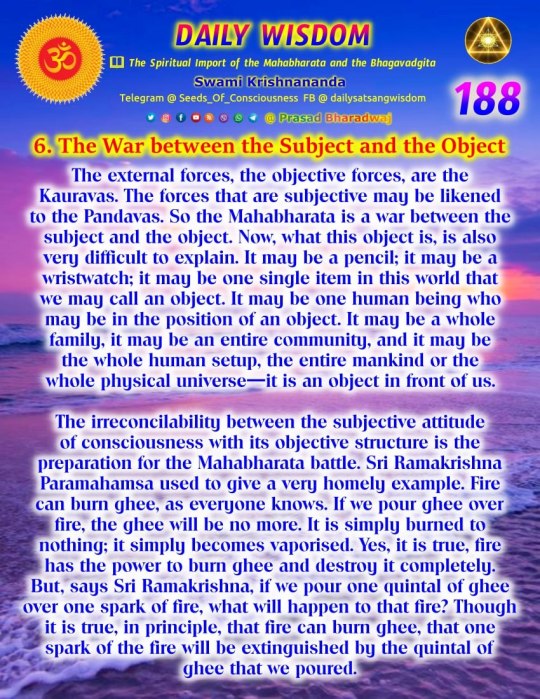
🌹 DAILY WISDOM - 188 🌹
🍀 📖 The Spiritual Import of the Mahabharata and the Bhagavadgita 🍀
📝 Swami Krishnananda
📚. Prasad Bharadwaj
🌻 6. The War between the Subject and the Object 🌻
The external forces, the objective forces, are the Kauravas. The forces that are subjective may be likened to the Pandavas. So the Mahabharata is a war between the subject and the object. Now, what this object is, is also very difficult to explain. It may be a pencil; it may be a wristwatch; it may be one single item in this world that we may call an object. It may be one human being who may be in the position of an object. It may be a whole family, it may be an entire community, and it may be the whole human setup, the entire mankind or the whole physical universe—it is an object in front of us.
The irreconcilability between the subjective attitude of consciousness with its objective structure is the preparation for the Mahabharata battle. Sri Ramakrishna Paramahamsa used to give a very homely example. Fire can burn ghee, as everyone knows. If we pour ghee over fire, the ghee will be no more. It is simply burned to nothing; it simply becomes vaporised. Yes, it is true, fire has the power to burn ghee and destroy it completely. But, says Sri Ramakrishna, if we pour one quintal of ghee over one spark of fire, what will happen to that fire? Though it is true, in principle, that fire can burn ghee, that one spark of the fire will be extinguished by the quintal of ghee that we poured.
Continues...
🌹 🌹 🌹 🌹 🌹
2 notes
·
View notes
Text

Una volta Vivekananda chiese a Ramakrishna Paramahamsa se avesse mai visto Dio. Ramakrishna rispose che stava vedendo Dio persino in quel momento. Vivekananda chiese: "In quale forma?" Ramakrishna rispose: "Proprio nella tua forma". Indicando i suoi discepoli aggiunse: "Questo Brahmananda, quel Nityananda... tutte sono incarnazioni di Dio. Sto vedendo Dio in tutti voi".
Incapace di comprendere le parole di Ramakrishna, Vivekananda chiese: "Swami, noi non siamo altro che mortali. Come puoi considerarci divini?"
Allora Ramakrishna disse: "Oh, semplicione... tu guardi tutti da un punto di vista fisico, mentre io vedo chiunque dal punto di vista Atmico. Ecco perchè tutto mi appare divino".
http://www.ramakrishna-math.org
******************
Once Vivekananda asked Ramakrishna Paramahamsa if he had ever seen God. Ramakrishna replied that he was seeing God even now. Vivekananda asked, "In what form?" Ramakrishna replied, "Just in your form." Pointing to his disciples, he added, "This Brahmananda, that Nityananda... all are incarnations of God. I am seeing God in all of you."
Unable to understand Ramakrishna's words, Vivekananda asked, "Swami, we are nothing but mortals. How can you consider us divine?"
Then Ramakrishna said, "Oh, simpleton... you look at everyone from the physical point of view, while I see everyone from the Atmic point of view. That's why everything looks divine to me."
http://www.ramakrishna-math.org
5 notes
·
View notes
Text

“Conoscere te stesso è il principio di tutta la saggezza" (Aristotele)
“Per conoscere in qualche modo la natura della vita dovete conoscere fino in fondo è senza alcuna riserva voi stessi” (Buddha)
“Chi conosce gli altri è sapiente chi conosce se stesso è illuminato” (Lao Tzu)
“Non uscire da te stesso, rientra in te. Nell’intimo dell’uomo risiede la verità" (Sant’Agostino)
“Oh uomo! Viaggia di te stesso in te stesso” (Rumi)
“Chi guarda fuori sogna, chi guarda dentro si risveglia” (Jung)
“Chi conosce se stesso conosce il mondo” (J.Krishnamurti)
“Chi agisce per gli altri senza approfondire la conoscenza di se stesso, non avrà niente da dare agli altri” (Thomas Merton)
“L’anima deve rientrare in se stessa” (Santa Teresa D’Avila)
“Non è ignoranza conoscere tutto, ma non il sé che tutto conosce?” (Sri Ramana Maharshi)
“Trovi la pace e la quiete solo conoscendo te stesso” (Nisargadatta Maharaj)
“Chiunque conosce se stesso, conosce il suo Signore” (Maometto)
“Quando conosci te stesso, conosci Dio” (Sri Ramakrishna Paramahamsa)
“Il regno di Dio è dentro di voi” (Gesù Cristo)
“Quello che stiamo cercando è ciò che sta vedendo” (San Francesco d’Assisi)
“Dio si nasconde nel fondo del fondo di noi stessi.” (Marguerite Porete)
“Nessuno conosce Dio se prima non conosce se stesso” (Meister Eckhart)”
“La conoscenza di sé è il fondamento della conoscenza di Dio” (San Giovanni della Croce)
“Colui che non conosce se stesso è privo di ogni cosa ed è lui stesso privazione” (San Tommaso)
“Dovremmo conoscere noi stessi sempre” (Ajahn Chah)
“Non vi affannate a cercare Dio fuori di voi, perché egli è dentro di voi, è con voi” (San Padre Pio)
#conosci te stesso
#citazioni
9 notes
·
View notes
Text
"How can a man conquer passion? He should assume the attitude of a woman. I spent many days as the handmaid of God. I dressed myself in women's clothes, put on ornaments, and covered the upper part of my body with a scarf, just like a woman. With the scarf on I used to perform the evening worship before the image. Otherwise, how could I have kept my wife with me for eight months? Both of us behaved as if we were the hand-maids of the Divine Mother. I cannot speak of myself as a man."
Ramakrishna Paramahamsa
15 notes
·
View notes
Text
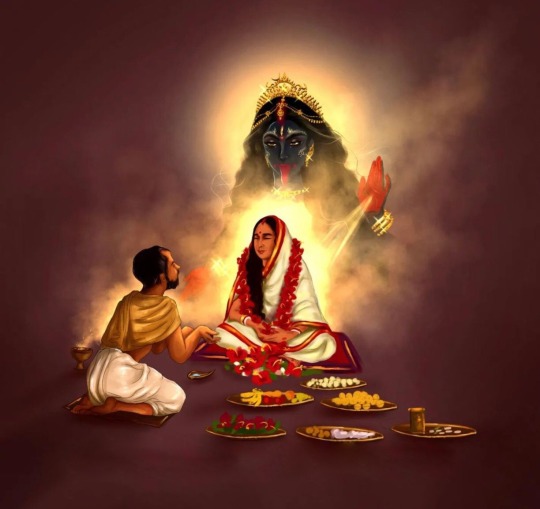
Sri Ramakrishna Paramahamsa and Sharada Devi. Jai Mahakaali. 😇🙏
#hindu#hinduism#spirituality#temple#shiva#hindu mythology#lordshiva#parvati#kailasa#krishna#sanathandharma#shakthi#sanathanadharma#hindu culture#ramayan#hanuman#shaktism#ganesha#ramasitarama#ganapati#ramakrishnaparamahamsa#ramakrishnamission#sharada#mahakali#kalimaa
34 notes
·
View notes
Text
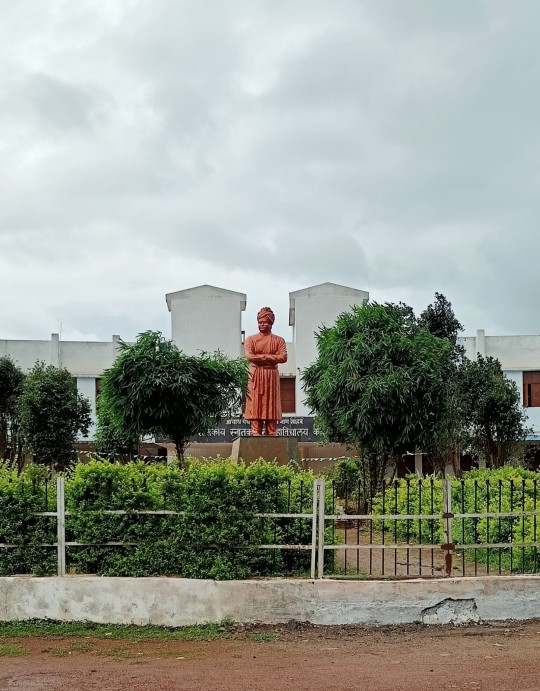
Do you know Swami Vivekananda was the member of FREEMASONS in India.. & not only a member he was a 2nd degree master also. I was stunned to see his name on the list ( the list goes on & on from jamshedaji tata to Motilal Nehru etc etc) but seeing a spiritual leader like Swami Vivekananda in this MASONIC LODGE gives me chills, that why? He needed to do that ... Why?
And you know we praise him for his speech in CHICAGO in which he started from sisters and brothers of America... But little do you know that the function was organised by Freemasons & they see themselves as a brotherhood culture ( which is strictly for male) ( but their spouses were allowed in parties) and call themselves as brothers..... That's why he calls brothers & sisters of America.
But but but...
When I read about Swami Vivekananda & dig deeper in Freemasonry then I realised that why did our forefathers or Vivekananda had done that i.e. to promote our culture, to speak the language of Britishers and to have them see that we are also capable of doing things they are doing....
You know their is an ideology i.e. ORIENTALISM i.e RULE INDIA THE INDIAN WAY. In which Britishers acknowledge that Indians were great civilization and prosperous at a time And it was us i.e. ARYANS ( refference to FAKE ARYAN INVASION THEORY which we can talk later) that made them ( Indians ) that great ......but now Indians are mixed up and they can't survive without us and are incapable to rule themselves . So following their typical WHITE MANS BURDEN : it is their ( Britishers ) responsibility to rule India.
And they challenged Indians that you are not capable enough to do things on your own, like the challenge to make a draft of constitution or the one to unite etc etc.....
So to have them ( Britishers) see us that we can also stand where you stand and can do things that you do, even more efficiently. Many leaders & great personalities joined these groups.
Anyway Swami Vivekananda ji is a whole diety which you can study all your life. Also if you read : An Autobiography of a Yogi .. you will come to know him much better + his guru...🙏 Ramakrishna Paramahamsa who attained the great level of consciousness, who himself feed MAA TARA.. their is an ocean to read about them.
& about Freemasons we will see something in another post. Maybe.
#secret society#freemasons#freedom struggle#spirituality#swami vivekananda#british#white mans burden#opemyoureyes#history
9 notes
·
View notes
Text
Belur Math, Howrah, West Bengal
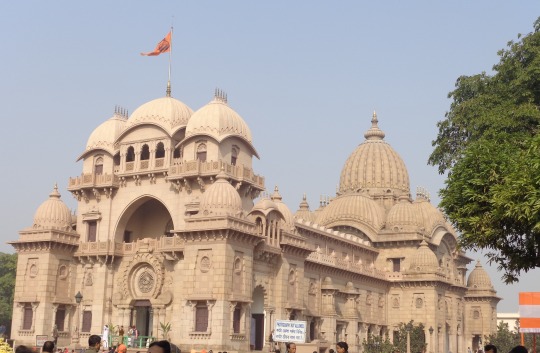
Belur Math, located in Howrah in West Bengal, India, is a famous Hindu temple and pilgrimage centre. It is closely associated with Sri Ramakrishna Paramahamsa and Swami Vivekananda, two famous spiritual teachers who lived in 19th-century India. This temple guide will provide an overview of the history, temple timing, legend, and other darshan information related to Belur Math.
2 notes
·
View notes
Text
T.R.Kanakammal’s uncle Ramakrishna Iyer, a Munsif at Tiruvannamalai, was one of the earliest devotees of Sri Ramana. Her father had also settled down in the town. Married against her wishes, she never led a family life. The book Cherished Memories (originally in Tamil) and the video Guru Ramana contain her memoires.

"I have been visiting the Ashram regularly but came to settle permanently in 1946. A few days before shifting, I had a strange and wonderful experience. It was my normal practice to get up at four in the morning and spend time in meditation. One morning, when I had not risen from the bed, I felt Bhagavan sitting beside me caressing my neck and throat. He smiled and said, “What is it that you gave me? Why is it that I love you so much?” All my senses were aware of Bhagavan’s presence by my side. I have no idea how long I lay like that. Even after getting up, I continued to be aware of some unusual feeling deep in my heart. A great peace had taken possession of my senses. Though I carried on with my routine activities, I was in a dazed state. My parents noticed the change in me. They had no choice but to let me have my way, and allowed me to be in Bhagavan’s company.
Living alone in a room near the Ashram, managing cooking and handling many domestic chores, meant difficulties and frustrations. But every morning my heart sang at the very thought of spending the day in Bhagavan’s presence. Entering the Ashram I could feel a transformation within myself. All my petty worries disappeared as if by magic. I also found each one of my faculties slowly calming down. It is difficult to describe this feeling. At times, it was as though I was totally detached from my body. I was in a state of ecstasy.
Sometimes, I found Bhagavan directing his eyes at me. The intensity of his gaze was, at times, almost impossible to bear. My mind would get completely absorbed in the Self without any kind of effort on my part. The peace and joy of the experience used to linger on for a long time after leaving the hall.
One day, after I prostrated and settled down in the hall, Bhagavan’s eyes stayed on me. Bhagavan’s gaze makes it impossible for you to keep your eyes open. The intensity of his direct look is too much for an ordinary human being to take. It is as though some invisible power has entered you and made its way to the very core of your being and there is nothing but the blissful awareness of the Self.
When this happened for a short while, I would gaze at Bhagavan with my eyes open. But within a few seconds, my eyes would close of their own accord and I got totally immersed in a peace, which is beyond description. I do not know how long I would stay in that state of bliss. When I managed to open my eyes, I saw that Bhagavan’s gaze was still upon me. Then I saw Bhagavan getting up and going out of the hall. I also stood up.
Kameswaramma (a lady devotee) embraced me and with tears in her eyes, said, “Kanakamma, you are indeed fortunate. Bhagavan’s eyes were on you all the time. Not for a moment did he shift his gaze. I was watching you and Bhagavan all the time. Bhagavan has been extremely gracious to you today. What more can you want!” I was unable to respond to these words because I was in a state beyond speech. The state of my mind was indescribable. I felt a deep peace within me, which stayed for many days afterwards. Every time I think about that day’s experience, I feel the same thrill of ecstasy.
One day a young, well-educated man came to Bhagavan, prostrated and sat down. Addressing Bhagavan he said, “Ramakrishna Paramahamsa was able to elevate Vivekananda to the state of nirvikalpa samadhi with just a touch. Can Bhagavan do the same for me?” Bhagavan did not say anything. The young man waited with obvious impatience for Bhagavan’s reply. After a few minutes of silence, Bhagavan looked at the youth and, in a soft voice asked, “You are another Vivekananda, I presume?” The young man was taken aback. He was at a loss for words. Greatly embarrassed, he left the hall quietly.
Bhagavan then told us, “It is difficult to appreciate the need for self-analysis and self-criticism. The tendency is to think of oneself as perfect. Though this person was eager to see whether I had the power of Sri Ramakrishna, he was not bothered whether he himself merited comparison with Vivekananda. That is because he assumed that he was perfect. Sri Ramakrishna bestowed that rare state upon Vivekananda alone because he was a person of rare spiritual merit.”
Once Subbalakshmi Ammal, a long-standing devotee and a cook at the Ashram was indiscriminately plucking flowers from a bush. Bhagavan asked, “What are you doing, Lakshmi?” She replied, “I am plucking flowers for puja.”
Pointing to the towel, which she had spread on the ground to collect flowers, Bhagavan said, “You already have so many flowers. Why pluck more?”
The lady artlessly replied, “There are so many flowers on this bush. I thought it would be better to gather them, rather than let them go waste.” Bhagavan retorted, “You have already seen and enjoyed the sight of the bush laden with beautiful flowers. Now you do not care whether anybody else gets a chance to enjoy the same heart-warming sight. Or maybe you have some exclusive right over this bush. Did you plant it and nurture it yourself, thus making it your personal property?”
Subbalakshmi Ammal told us that after the incident, she was reminded of Bhagavan’s words every time she saw a flowering bush!"
- Face to Face
On Jayanti morning, January 1, 2010, Kanakammal circumambulated the Matrubhuteswara Shrine and then entered Bhagavan's Samadhi Hall. Walking around the Samadhi she stopped on the north side to gaze at the Lingam of the Maharshi, while it was washed in preparation for the grand puja that was about to take place, commemorating the 130th birth anniversary of Sri Ramana. Right at that place she collapsed and was absorbed into her Master and Lord. How fitting an end for one who knew no other in her long life than Bhagavan Sri Ramana.
Kanakammal was an inestimable source of inspiration to the legions of devotees who sought her presence. She left us her reminiscences (Cherished Memories, in English) and several other books which shed light on the teachings of Bhagavan.
https://www.arunachala.org/newsletters/2010/jan-feb#article.3
https://www.youtube.com/watch?v=SLM6wPY7p9A
2 notes
·
View notes